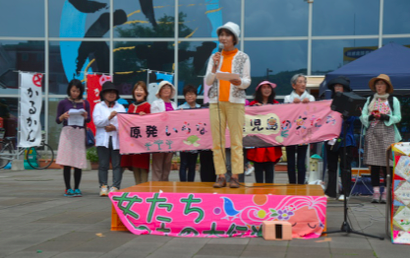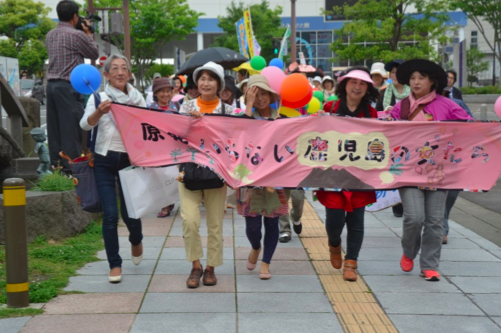Who’s Who: Torihara Ryōko, inspiring women to oppose the Sendai NPP in Kagoshima
by Ogawa Misako, Kagoshima City Councilor (Independent)

Torihara Ryōko is quoted almost every time the Japanese news media covers issues concerning the Sendai Nuclear Power Plant in Kagoshima Prefecture. This is because she is a prominent person in the movement against the Sendai NPP. Some of the positions she holds are: Facilitator of “Sendai Dayflower” (so-called because the Asiatic Dayflower is a small purple flower but it turns pink in the presence of radiation) which was founded by local mothers and women schoolteachers; President of the Network of Groups against the Construction of the Sendai NPP, which acts locally in the municipalities surrounding the NPP; and Co-Director of the “Stop Sendai NPP! March 11 Campaign” Kagoshima Executive Committee, which was established with the participation of nearly one hundred groups from across the nation after the Fukushima Daiichi NPS disaster.
I became acquainted with Ms. Torihara more than 30 years ago through Green Coop Kagoshima consumer activities. That was when many housewives who had not previously been interested in nuclear power plants rose up after the Chernobyl nuclear plant disaster. While the then Ministry of Health and Welfare (today’s Ministry of Health, Labor and Welfare) temporarily set the limit of radioactive cesium in imported food items to 370 Bq/kg and several organizations set their own limits to one tenth the MHW’s limit, namely, 37 Bq/kg, the Green Coop started up a radioactivity measurement program to ensure that it would procure only food items of 10 Bq/kg or less. Since the Tokyo Electric Power Company (TEPCO) Fukushima Daiichi disaster, the Green Coop has been disclosing radioactivity measurement data for all food products, while following its own limit of 10 Bq/kg.
Moved by the attitude of the Green Coop, which was doing its best to protect life, Ms. Torihara and I, from the standpoint of mothers, made our utmost efforts to tell other mothers that nuclear power plants are extremely dangerous and that they could not operate without the sacrificing of people’s lives. Busily and earnestly engaging herself in all the activities she thought up, including signature collection campaigns, movie screenings, lectures, protest rallies, and lawsuits, Ms. Torihara eventually became the chairwoman of Green Coop Kagoshima. At the time, I was a member of a committee at the Green Coop, and I proposed that we commit to shutting down nuclear power generation. She and I thus continued to work together as partners. Later, I was elected to the city assembly under the slogan of ending reliance on nuclear power. Ms. Torihara and the mothers began to submit many petitions to the assembly, starting from antinuclear petitions and others concerned with preserving life. While repeating these concrete actions, the mothers gained steadfast strength opposing nuclear energy.
One of Ms. Torihara’s big concerns is her son, who has a disability. A heart attack–induced reduction in oxygen supply to the brain has reduced movement in his arms and legs. While taking care of him, she has been diligently and energetically committed to anti-NPP activities. Encouraged by her enthusiasm, many women make great efforts for the movement. One of the events that impressed me most was when the group Kagoshima and Fukushima Women Against Nukes organized a joint rally in front of the national diet building and TEPCO head office building. This was followed by the Women Against Nukes Mothers’ Day rally, which took place locally, in the vicinity of the Sendai NPP site. These events were organized out of desperate feelings to prevent Sendai NPP from being restarted. Sendai NPP was the first nuclear power plant in Japan to be restarted after the disaster in Fukushima, which occurred 25 years after the Chernobyl disaster. To vindicate the regrets of those who have departed from this life without seeing the decommissioning of nuclear power plants in our long history of anti-nuclear activities, we are determined to continue our commitment to realizing the decommissioning of the Sendai NPP.

